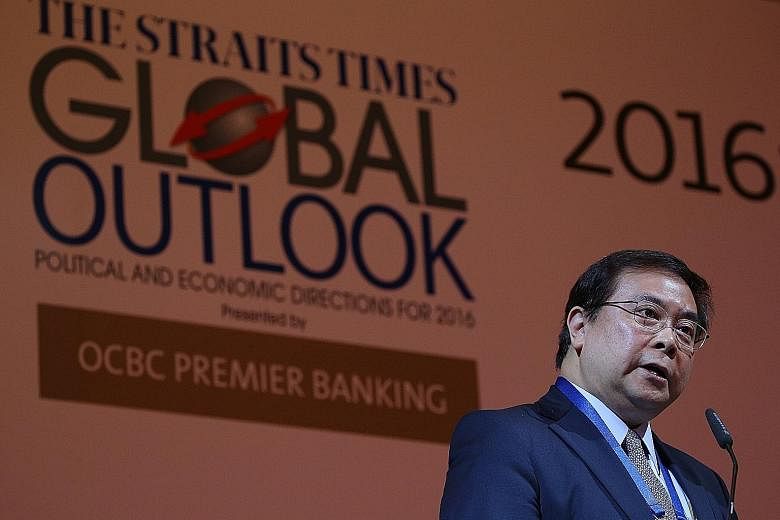The reduction in global trade should not be attributed to China alone as activity has also been falling around the world, according to OCBC group chief executive Samuel Tsien.
Mr Tsien told a forum last Friday that China's lower economic growth is a general concern given the country's role as as a key economic engine, but China is still expanding, just at a slower pace.
He added that structural changes in the United States have also had a part to play in the dip in trade movement since restructuring its economy.
Mr Tsien told The Straits Times in a separate interview: "Some manufacturing activities have been reinstated in the US, which reduces the need for some of the global trade that had been happening."
He added that China has also upgraded its own manufacturing base.
"Some of the higher value-added goods, which previously required to be imported, can have parts manufactured in China now."
Mr Tsien was also part of an expert panel at the ST Global Outlook Forum that discussed the region's business prospects before the Asean Economic Community comes into effect by the end of the year.
He told the forum that China's economy should not be judged purely on gross domestic product (GDP) growth.
"China places more emphasis on job creation because that is a better reflection of the health of its economy and the stability of society."
He noted that more jobs have been created over the past five years than in any of the previous five-year periods. Last year, 13.2 million jobs were created, which was far more than the 11 million jobs created in 2009 when GDP growth was in the double digits, Mr Tsien added.
He also noted that "low-value" T-shirts were commonly produced by China in the 1980s, but that is hardly the case now as that sort of production has moved to other regions like Latin America.
"This is good evidence that China has moved up the value chain in terms of its manufacturing base," he added.
This shift means that for each dollar of production cost, China is able to produce a higher value of output.
This will not only be beneficial to the Chinese economy, but also shape it to become more service-oriented as economic conditions improve, said Mr Tsien.
China is also embracing other services in fields such as product design, for instance.
He said: "It means that the economy is gradually moving up from the most basic type of economy to a higher-value economy, and this is also important for any country's development."
That will eventually have a trickle-down effect on the rest of the world, which has already been happening over the years.
Citing Singapore firms, Mr Tsien noted how they rode on opportunities, thanks to China's growth in the last 10 years, and have been providing property services that China requires.
He says developers have been going there to build higher-value-added properties, hotels and serviced apartments, which is their forte.
Before the Chinese economy picks up, Mr Tsien said that firms have to brace themselves in the "interim period, where China's buying has been reduced and global trade has not yet increased".
He also added that this includes the reality of fewer business opportunities for OCBC.
However, as the economy improves and China starts to require more higher-class goods and services, Singapore's expertise will continue to come into play, for instance.
As China makes that shift, it will have more demand for things it does not want to produce or does not have, noted Mr Tsien.
These include more discretionary goods and services such as fine dining and housing that is more attractive in terms of layout and design.
"When the economy moves up, the service content, the customers' behaviour will change and they will demand more enjoyment.
"As a result of that, it will have a more positive impact on the world economy, including the Asean economy," he added.



